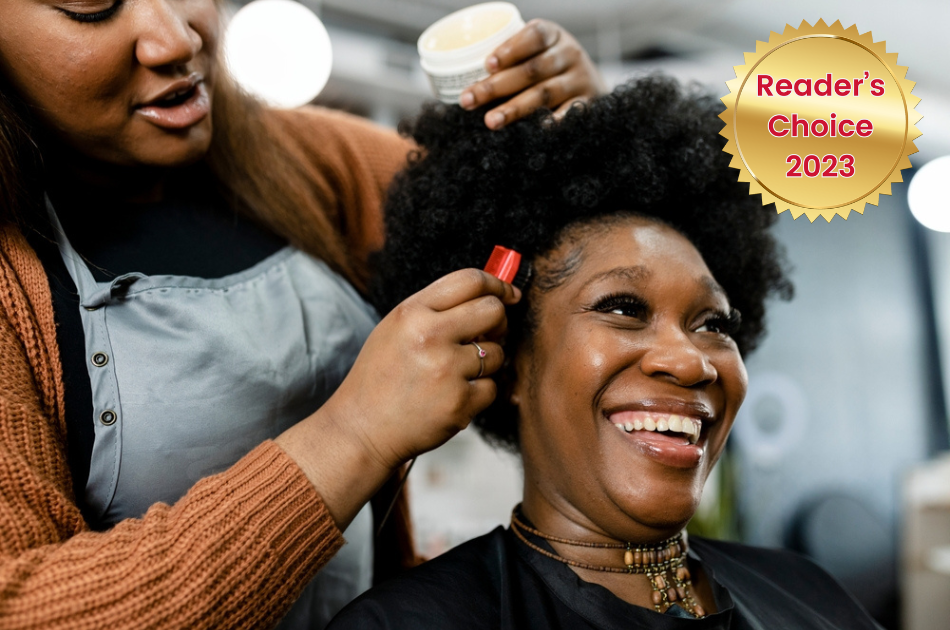DECEMBER 21ST, 2023 UPDATE: This solution is a Reader’s Choice selection of 2023! Here’s why one of our fellow optimists nominated this story:
“A few days before [this article was published], I was at my favorite salon getting my hair done. As she was conditioning my hair and massaging my scalp with all ten fingers, my style technician asked what time I had to be back to work. As I slowly came back from the massage trance I said, ‘however long it takes because I can tell my manager that I was in therapy.’
I sent this article to my style technician and told her to continue being an empathetic listener and allowing me to share during my appointment time.
Getting your hair done and talking to your beautician is cultural part of my background. This article reminded me of that value in my community.”
In the bustling alleys of Togo’s capital, Lomé, Joseline de Lima found solace in an unexpected place—the vibrant salon of her hairdresser, Tele da Silveira. As a single mother dealing with bereavement and the weight of her many responsibilities, professional therapy felt out of reach. But, behind the neon lights and colorful shelves, Tele became into more than just a stylist—she became an empathetic listener, providing a safe space for Joseline to communicate her problems.
What is the driving force behind this transformation? Bluemind Foundation‘s non-profit training program equips hairdressers with mental health counseling skills in West and Central African cities. This novel strategy intends to close a significant gap in mental health treatment in one of the world’s poorest places.
Mental health care in Africa’s periphery
Togo and its neighboring countries confront an uphill battle in an area where mental health treatments are sparse. A lack of resources has resulted in a staggering gap in mental health support, which has been worsened by violent conflicts, drug use, adolescent unemployment, and climate-induced displacements. With only five psychiatrists for over eight million people in Togo, traditional treatments are frequently the sole option for many people suffering from severe mental illnesses.
One of Togo’s few psychiatrists, Daméga Wouenkourama, underscores the ongoing struggle: “Mental health remains a foreign concept to most people, including our leaders and fellow doctors.”
Hair salons as mental health havens
Organizations are utilizing atypical yet accessible spaces—hair salons—to meet this important need. Hairdressers are taught to recognize distress signals, provide compassionate listening, and, most importantly, refrain from harmful advice or gossip through customized training sessions. Clients discover not only a hair makeover but also a nonjudgmental space to disclose their emotional concerns, ranging from financial difficulties to domestic violence.
Marie-Alix de Putter, the visionary behind the Bluemind Foundation, understands the significance of such spaces: “Society expects them to be beautiful, and hair often comes first. We go where women are.”
Redefining mental health support
While these hairdressers are designated as “mental health ambassadors,” their goal is not to replace trained therapists, but rather to direct customers to appropriate mental health care. However, the barrier remains high—therapy is still out of reach for many people, with sessions costing more than a day’s wages for a large section of the population.
Despite increased awareness and vows from African countries to address mental health issues, social stigma remains a serious impediment. Togo’s first female psychiatrist, Dr. Sonia Kanékatoua, acknowledges the tough battle: “People are becoming aware of mental health issues, but social stigma remains.”
The impact of compassionate listening
Joseline de Lima’s metamorphosis demonstrates the initiative’s enormous influence. She faces her obstacles with increased tenacity, pushed by her hairdresser’s gentle nudges toward spiritual music and therapeutic walks. Joseline, having recognized the significance of formal therapy, intends to seek professional assistance as a result of her hairdresser’s advice.
The emotional toll on these stylists, however, cannot be underestimated. Despite receiving their treatment sessions, people sometimes reach a point when they are unable to assist due to their mental health issues.
In the midst of playing puppies and awaiting clients, Tele da Silveira ponders aloud, “Why does it feel like everyone suffers from mental health issues?”
By empowering hairdressers to become more than just stylists, this pioneering approach fosters a sense of community and support in spaces where beauty and empathy interlace.











